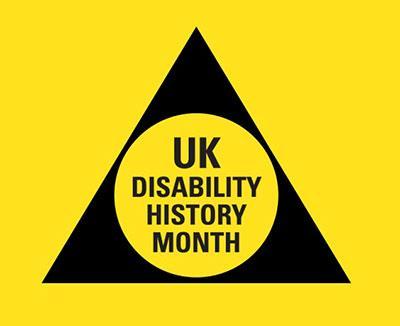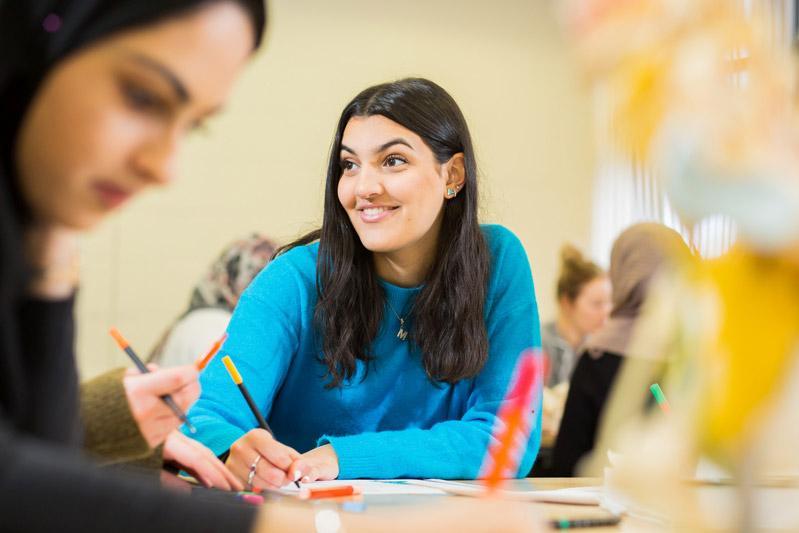UK Disability History Month
Disability History Month (DHM) takes place in the UK between 14 November and 20 December this year. The 2024 theme is Disability, Livelihood and Employment.
Disability History Month provides an opportunity to challenge stereotypes, promote inclusivity, and advocate for equal rights for disabled individuals – all things which we are extremely passionate about at the University of Bradford. We have disability staff networks (N-Able and neurodiversity staff networks) and a Disability Service that work tirelessly to highlight these issues, promote change where needed, look at continuous development and aim to support us all to be an inclusive University. This work also involves senior leaders, staff, students and external partners with and without lived experience of being disabled.

Each year we recognise Disability History Month by:
- Celebrating the contributions that disabled people are making to our University and to wider society,
- seeking to educate ourselves and each other on disability rights,
- identifying and tackling barriers to inclusion.

What we are doing in 2024
Disability History Month Launch
Date/Time: 14th November, 12:00 - 13:00
Location: Richmond Building
Open to Members of the N-able and Neurodivergent Staff Network Members only.
If you are a member and have not received an invitation then please contact [email protected].
Disability History Month Stand
Date/Time: 20th November, 11:00 - 14:00
Location: Richmond Building, Atrium
Come along and find out more about our events for this years Disability History Month, how to join a Staff Network and what support is available for our Disabled Staff and Students.
Open to Staff and Students.
Disability in Archaeology - Guest Lecture Series with Jessica Gavin
Date/Time: 19th November, 17:30 - 18:30
Location: Hybrid Event - University of Bradford and via Teams
Estimating impaired Activities of Daily Living through Degenerative Joint Disease to identify disability in a skeletal sample.
Jess Gavin is a passionate, budding, disabled scientist. She was diagnosed with a neuro-muscular disability called Dystonia at the age of 5 and now takes pride in sharing her disabled experience throughout her work. Her current research interests include biological and forensic anthropology - focusing on challenging conventional thought patterns and looking at creating innovative systems and methods of understanding life.
Register for this guest lecture here.
This event is open to all.
Reasonable Adjustments- Rights, Rhetoric or Fantasy by Libby Beckett- Wrighton
Date/Time: 27th November 2024, 14:00-16:00
Location: Hybrid, in person at University of Bradford, Richmond Building, Room D2
Time to myth bust and understand that this is equality, not special treatment.
The Equality Act stipulates Reasonable Adjustments need to take place for disabled people to be able to take part fully in their daily living activities. It is a legal right, however some organisations say that they will and do make the adjustments not understanding the legal obligation , others believe that they don’t have have to and finally others believe it is a mystical process that has to take place with another person and not them.
Libby became a disabled woman over 40 years ago. Through the intervening years, she has shouted, protested , cried , cheered and laughed about being a disabled woman . Her journey has led into activism, lecturing and social work.
Register for this event here
This event is open to all.
MaRiLU (Managing Risk for Impaired Lab Users), By Stuart Walker and Dr Sobia Kauser.
Date/Time: 5th December 2024, 13:00 - 14:00
Location: Online via Teams
One of the enduring challenges in HE is to ensure that every student’s needs are met. The number of disabled students in HE has steadily increased, yet research shows they are more likely to drop out of university early. Disabled students on STEM programmes face many barriers in laboratory settings. It is against this backdrop that the MaRILU system was developed.
MaRILU utilises a student-centred approach that places students’ lived experience, knowledge, and expertise of their impairment(s), whether permanent or temporary, at the heart of the process. It facilitates reasonable adjustments in laboratory environments and helps create an inclusive laboratory learning experience for all.
Register for this event here.
This event is open to all.
As a disability advocate at our university, I urge both staff and students to embrace this Disability History Month as a time to champion inclusion in employment. Together, we can create a campus environment where every individual, regardless of ability, has the opportunity to thrive and contribute their unique talents. Let's work collaboratively to ensure that our workplaces reflect the diversity of our community and empower all voices to be heard.
Steve Gilley, Director of Infrastructure & Advocate for Disability
Support the University offers
Support for staff
The n-able staff network has a focus on promoting disability equality and the benefits of a diverse workforce. Find out more or to join n-able please email [email protected].
The Neurodivergent staff network is ND-led and aims to bring neurodivergent staff together to offer each other support based on our shared experiences. To find out more or to join n-able please email [email protected].
The Disability Equality Action Group (DEAG). Key principles of this group are to empower individuals to build workplaces, services and communities where everyone can achieve their potential, and to understanding the lived experiences of staff, students so to directly inform institutional change, both in our physical environment and in relation to attitudes and culture.
If you you would like to join or find out more information, contact [email protected]
Support for students
The Disability Service (Please note this link is only accessible for current staff and students) team work with students to identify and recommend disability-related study support and reasonable adjustments.
The team can help identify barriers and challenges students may face on their course. Students can disclose a disability at any point during their admission or studies with us. Students will need to provide evidence about their disability.
Adjustments are identified based on a discussion with the student and the evidence provided. The adjustments will be listed in a document called the Learner Support Plan. We can also support UK students, to obtain external support through the government's non-means tested Disabled Students Allowance (DSA).
National disabled staff survey (NADSN) launch - Ride Higher
Coinciding with the start of Disability History Month, we see the launch of the first ever National Disabled Staff Survey. Further details on RIDE Higher and the survey can be found below. It is hoped that the NDSS can reach as many disabled staff working in Higher Education as possible.
Register your place for the launch of the survey event.
